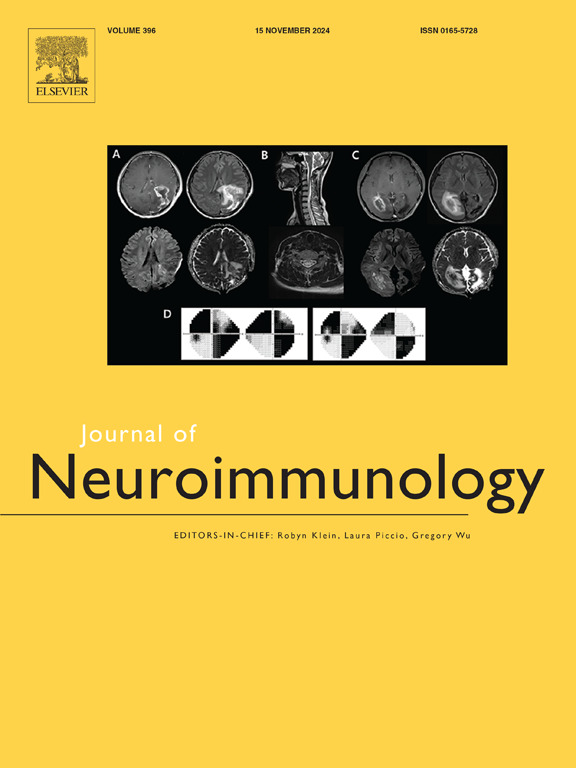IGLON 5血清阳性率——印度回顾性实验室研究
IF 2.9
4区 医学
Q3 IMMUNOLOGY
引用次数: 0
摘要
目的iglon 5病是一种罕见的免疫介导的牛头病,其在印度的患病率尚不清楚。我们的目的是确定研究人群中抗IgLON 5抗体的血清阳性率。方法回顾性研究于2022年2月至2023年12月在印度喀拉拉邦高知Amrita医学科学研究所神经免疫学实验室进行。从实验室记录中确定接受IgLON 5检测的患者并提取其详细信息。结果在1027例IgLON 5抗体检测中,33例IgLON 5抗体阳性。平均年龄- 63.45±9.59岁;男性−21]。血清阳性26例,脑脊液阳性4例,血清和脑脊液均阳性3例。本研究人群IgLON 5血清阳性率为3.21%。本实验室研究显示印度IgLON 5疾病血清阳性率增加。遗传易感性可能是一个潜在的解释。需要进行人口研究和遗传学研究来确定这一点。然而,这份简短的报告指出,临床医生需要提高对IgLON 5疾病的认识,因为它在我们的人群中更为常见。本文章由计算机程序翻译,如有差异,请以英文原文为准。

Seropositivity rate of IGLON 5– A retrospective laboratory based study from India
Objective
IgLON 5 disease is a rare immune mediated tauopathy and its prevalence in India is unknown. Our aim was to determine the rate of seropositivity of anti IgLON 5 antibodies in our study population.
Methods
Retrospective study done between February 2022 and December 2023 at the Neuroimmunology laboratory of Amrita Institute of Medical Sciences, Kochi, Kerala, India. Patients who underwent IgLON 5 testing were identified from laboratory records and their details extracted.
Results
Out of a total of 1027 patients tested for IgLON 5, 33 were positive for anti IgLON 5 antibody. [Mean age - 63.45±9.59 years; males −21]. Twenty-six cases were positive in serum, 4 in cerebrospinal fluid and 3 in both serum and CSF. The rate of seropositivity of IgLON 5 in this study population was 3.21 %.
Discussion
This laboratory study shows an increased seropositivity rate of IgLON 5 disease in India. Genetic predisposition could be a potential explanation. Population based studies and genetic studies will be required to ascertain this. However, this brief report points at the need for increased awareness among clinicians regarding IgLON 5 disease, as it is more common in our population.
求助全文
通过发布文献求助,成功后即可免费获取论文全文。
去求助
来源期刊

Journal of neuroimmunology
医学-免疫学
CiteScore
6.10
自引率
3.00%
发文量
154
审稿时长
37 days
期刊介绍:
The Journal of Neuroimmunology affords a forum for the publication of works applying immunologic methodology to the furtherance of the neurological sciences. Studies on all branches of the neurosciences, particularly fundamental and applied neurobiology, neurology, neuropathology, neurochemistry, neurovirology, neuroendocrinology, neuromuscular research, neuropharmacology and psychology, which involve either immunologic methodology (e.g. immunocytochemistry) or fundamental immunology (e.g. antibody and lymphocyte assays), are considered for publication.
 求助内容:
求助内容: 应助结果提醒方式:
应助结果提醒方式:


